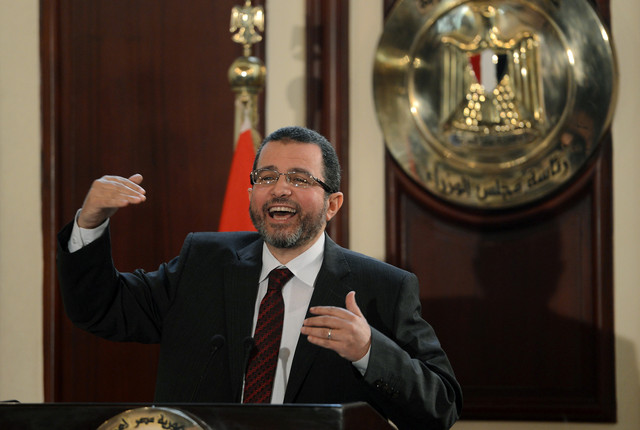Swiss Prosecutor General Michael Lauber reviewed the progress of the restitution of the former regime’s frozen assets in Swiss banks during a Saturday press conference in Cairo.
He said there are CHF 590m in frozen assets for a total of 14 accused officials, including former president Hosni Mubarak, his family, and 30 legal assistance requests were presented to the Egyptian authorities since 2011 in this regard. However procedures are taking lengthy years, mainly to prove a link between the criminal verdicts issued against the accused and the frozen assets.
“I trust the Egyptian government as far as it concerns us and that is why I am here for the second time and the team around the Egyptian attorney is very cooperative,” Lauber told Daily News Egypt.
A meeting was held with Lauber’s Egyptian counterpart Nabil Sadek later during the day to discuss next steps in the process. “[Saturday’s] meeting with my Egyptian counterpart was very fruitful and indicated there is a will to follow the legal path in returning funds,” Lauber said.
According to Lauber, he understands that Egyptians believe that something went wrong and they want justice and need their money back but as a lawyer, he needs to prove this through court decisions since the lawyers of the defendants claimed the opposite is true.
He said the court decisions take a long time in Swiss courts as well, not only in Egypt but the complicated political situation in Egypt has also stalled the progress.
Eight judicial committees were formed since 2011 to follow up on the money smuggled to foreign private banks, including Swiss banks, but all of them failed to retain control of the funds since most of the corruption-related charges against Mubarak-regime figures have been dismissed.
However, in early January, the Court of Cassation rejected an appeal issued by Mubarak and his two sons, Gamal and Alaa, on an earlier verdict for three years and four years in prison respectively in May 2015, on charges of embezzling state funds that they claimed to be using for renovating presidential palaces.
Head of the anti-corruption unit at the Egyptian Initiative for Personal Rights (EIPR) Osama Diab told Daily News Egypt that “the verdict has nothing to do with the smuggled funds in Switzerland. Switzerland has chosen the hardest and most conventional legal way to return the funds”.
According to Diab, the organised crime investigations that were launched earlier by the Swiss authorities could have facilitated the process, but now that they decided to close the investigations, the process may take many years and have no real impact.
He further clarified that, if returned, the funds belonging to Mubarak will make only up to approximately 2.6% of the total smuggled funds.
Meanwhile, Egypt’s constant change of judicial committees following up on this issue with almost every cabinet reshuffle and with every new justice minister in particular impacts foreign governments’ faith in taking further procedures, according to Diab.
A former member of one of the judicial committees formed to restore funds told Daily News Egypt, on condition of anonymity, that the legal framework is notoriously time-consuming and the delay does not imply any shortcoming, whether from the Egyptian or Swiss side. Moreover he denied that there may be any other causes behind the delay, except the legal process.
Lauber’s Saturday statements provoked a negative response from Mubarak supporters. They republished a statement on their official Facebook page a statement issued from the Central Bank of Egypt in 2011, which said that no funds were transferred by Mubarak abroad after the 25 January Revolution, as an order was issued freezing their assets.
In a previous study by the International Consortium of Investigative Journalism (ICIJ), it was revealed that the wealth of the trade minister under Mubarak’s rule, Rachid Mohamed Rachid, in HSBC’s Swiss private bank alone had reached $31m.
The money was hidden in 10 separate secret bank accounts, under the name of a company in the Cayman Islands. The documents also revealed the role played by America’s Citigroup in managing and hiding Rachid’s money through subsidiary companies and banks it owns in the UK, Switzerland and the Cayman Islands.
A copy of HSBC’s response to the leaked documents provided to Daily News Egypt stated: “It is unclear if the integrity of the data has been preserved, or even if the original data itself was complete and accurate.”
“Falciani systematically and deliberately downloaded details of accounts and clients which they described as a blatant criminal violation of Swiss law,” the statement read, referring to Hervé Falciani, the Italian whistleblower who was jailed in November for the biggest banking leak in history. The leak exposed wrongdoing on the part of HSBC’s Swiss private bank.
However the bank announced that it has amended its terms and conditions to combat money laundering and tax fraud.


